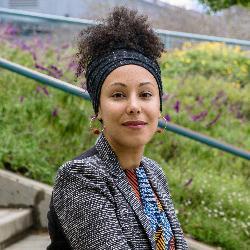Principal Faculty

- Pronouns she/they
- Title
- Associate Professor
- Division Social Sciences Division
- Department
- Sociology Department
- Critical Race and Ethnic Studies
- Affiliations Science & Justice Research Center, Legal Studies, John R. Lewis College
- Website
- Office Location
- Rachel Carson College Academic Building, 204
- Office Hours On leave 2024-2025
- Mail Stop Rachel Carson College Faculty Services
- Mailing Address
- 1156 High St.
- Santa Cruz California 95064
- Faculty Areas of Expertise Sociology, African Diaspora, Critical Race and Ethnic Studies, African American / Black Studies, Immigration, Activism, Discrimination and Inequality, Labor and Social Movements
- Courses SOCY105B: Contemporary Social Theory, SOCY117E: Migrant Europe, SOCY170P: The Political Economy of Race, SOCY196S: Black Geographies and the Imperative of Abolition, SOCY202: Contemporary Social Theory, SOCY240: Identity and Inequality, SOCY290W: Black Geographies
Summary of Expertise
I am a critical human geographer whose work addresses the racial politics of migration and citizenship and the insurgent, abolition geographies of the Black Mediterranean. In 2020, I was named a “Woman of the Year” by Italy’s largest newspaper Il Corriere della Sera for my research on the Black diaspora in Italy. My work has been supported by the Mellon Foundation, the Stanford Center for Advanced Study in the Behavioral Sciences, the Hellman Foundation, the UC Humanities Research Institute, the Ford Foundation, the Leonardo Da Vinci Society, and the Italian Scientists and Scholars in North American Foundation.
I am currently at work on several interconnected projects about Black (and) Italian cultural politics. In a series of essays, I am undertaking a conjunctural reading of U.S. Reconstruction and the Italian Risorgimento staged via a critical dialogue between W.E.B. Du Bois and Antonio Gramsci, as well as an exploration of the transnational circulations of theories of race and crime between Italy and the United States, all as ways to theorize the politics of abolition across the Black Atlantic and Black Mediterranean diasporas. In a documentary film collaboration with Christina Zanfagna, John Gennari, and Michael Whalen, we are delving into the complex spatial histories of Black-Italian contact zones across three cities in the United States and Italy. With Angelica Pesarini, I am co-editing a special issue of California Italian Studies on the politics of race and Blackness in Italy. I am also working on a multi-generational memoir that takes my parents’ Black / Italian love story, which unfolded amid the Cold War and disco, as a starting point for understanding the global geopolitics of Blackness.
I am founder and co-facilitator of the UCSC Black Geographies Lab and an affiliate of the Science & Justice Research Center, the Italian Studies Program, the Legal Studies Program, the Visualizing Abolition Studies Certificate Program, and the Center for Monster Studies at UC Santa Cruz. I also serve on the editorial board of the journal California Italian Studies.
I am the program director of the Black Europe Summer School, an intensive course on citizenship, race, and the Black diaspora in Europe that is held for two weeks each summer in Amsterdam, the Netherlands. In addition, I continue to collaborate with activist collectives in the United States and Europe working at the intersection of anti-Blackness and xenophobia.
Biography, Education and Training
- PhD: Geography and Science and Technology Studies, UC Berkeley (2018)
- MPA: Brown University (2010)
- AB: International Relations and Africana Studies, Brown University (2009)
Selected Publications
Books
- The Black Geographic: Praxis, Resistance, Futurity, eds. Camilla Hawthorne and Jovan Scott Lewis (Duke University Press, 2023).
- Razza e cittadinanza. Frontiere contese e contestate nel Mediterraneo nero (Astarte Edizioni, 2023).
- Contesting Race and Citizenship: Youth Politics in the Black Mediterranean (Ithacha: Cornell University Press, 2022).
- The Black Mediterranean: Bodies, Borders, and Citizenship, ed. The Black Mediterranean Collective (Basingstoke: Palgrave Macmillan, 2021).
